An interesting study topic has recently led me to some eye opening conversations. I’ve been talking with colleagues about the difference in our practice when we are strengths focused rather than deficit focused.
Strengths based practice takes its cues from the Positive Psychology movement. Positive psychology is not, as has been suggested, the study of blind optimism, but encourages a shift in the way we study human behaviour and provide therapy. It advocates an alternative to the traditional biomedical model of disease pathology and fixing problems by utilising techniques that encourage clients to focus on positive experiences and building on their strengths. Researchers such as Kauffman,C suggest that as an athlete exercises certain muscles to become stronger, people who use their strengths regularly will function better in life. (For more information and references on positive psychology see this interesting article).
Some interesting studies from the Gallup institute of research indicate that “people who do have the opportunity to focus on their strengths every day are six times as likely to be engaged in their jobs and more than three times as likely to report having an excellent quality of life in general.” In Strengths Finder 2 (2007), author Tom Rath uses the Gallup research to describe the 34 most common human talents and advocates finding opportunities for using your 5 top strengths regularly in your work. Purchasers of the book can take the on-line test which also provides strategies for applying your strengths.
I love the idea that we are each unique in our strengths combinations and that playing to our strengths can help us in our practice.
So what does a Strengths based focus allow us to do?
- Be creative about generating solutions
- Foster hope for improvement
- Shift our mindset
- Be grateful – and generate happy hormones
- Be proactive with challenges
- Choose our response to a situation
Can you see how you can apply this to your own life and your client intervention?



